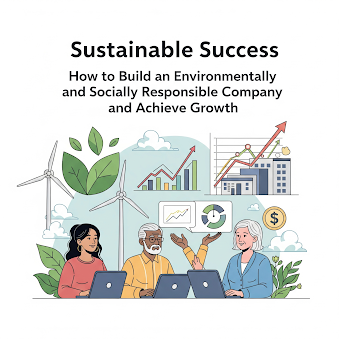In the constantly evolving business world, simply maximizing profits is no longer the sole objective for companies. The concept of sustainable success has become central, merging economic growth with environmental and social responsibility. This isn't just a fleeting trend; it's a fundamental business strategy for building strong, resilient companies capable of enduring future challenges.
What is Sustainable Success?
Sustainable success goes beyond merely complying with environmental regulations or engaging in occasional charitable acts. It means integrating environmental and social principles into the very core of the business model, from the supply chain to company culture. The goal is to create long-term value for all stakeholders—customers, employees, investors, and the communities in which the company operates—while minimizing the negative footprint on the planet.
Why Should Companies Embrace Sustainability?
Shifting towards sustainability isn't just "the right thing to do"; it's also a smart business strategy that offers tangible benefits:
Consumer Appeal: Today's consumers increasingly prefer companies that demonstrate a commitment to sustainability and ethics. This can lead to increased brand loyalty and customer base growth.
Attracting and Retaining Talent: Employees, especially Millennials and Gen Z, seek to work for companies whose values align with their personal ones. Sustainable companies become a preferred destination for talent.
Cost Efficiency: Sustainable practices, such as optimizing energy and water consumption and reducing waste, often lead to significant savings in operational costs.
New Innovation Opportunities: Thinking about sustainability pushes companies to innovate in products, services, and processes, opening up new markets and creating a competitive advantage.
Improved Company Reputation and Relationships: Environmentally and socially responsible companies enjoy a better reputation, strengthening their relationships with investors, regulators, and local communities.
Access to Sustainable Financing: Many investors and financial institutions now prefer to invest in companies with strong Environmental, Social, and Governance (ESG) performance.
Steps to Build an Environmentally and Socially Responsible Company
To achieve sustainable success, companies can adopt practical steps:
Assess Impact: Understand the current environmental and social footprint of your operations.
Set Goals: Establish clear, measurable sustainability objectives (e.g., reducing emissions, using recycled materials, supporting local communities).
Integrate Sustainability into Core Operations:
Sustainable Supply Chain: Choose suppliers committed to ethical and environmental practices.
Resource Efficiency: Use renewable energy, reduce water consumption, and implement recycling programs.
Sustainable Product and Service Design: Develop products with longer lifespans, that are recyclable, or made from eco-friendly materials.
Foster a Culture of Social Responsibility: Encourage employees to participate in sustainable initiatives and support local community causes.
Transparency and Communication: Regularly and transparently report on sustainability efforts and progress to the public and stakeholders.
Challenges and How to Overcome Them
Companies might face challenges such as the initial costs of investing in sustainable technologies or difficulties in accurately measuring impact. However, these can be overcome through strategic planning, seeking government incentives, collaborating with specialized partners, and viewing sustainability as a long-term investment rather than just a cost.
Building an environmentally and socially responsible company is a path to sustainable success that benefits everyone. It's a business approach that ensures economic growth while preserving our planet and empowering our communities.












No comments:
Post a Comment